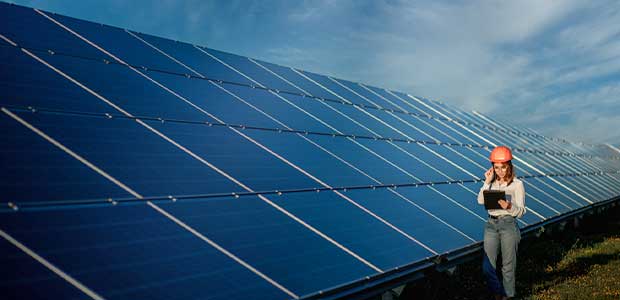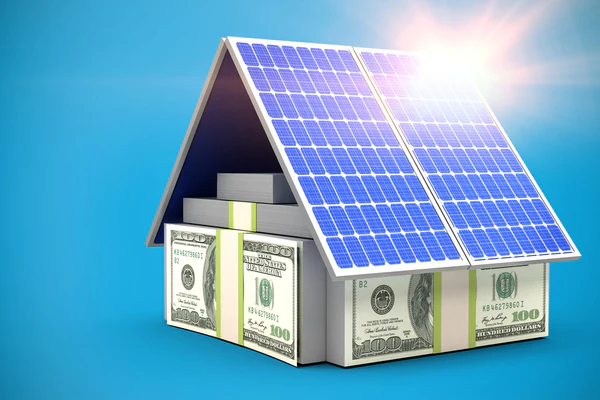Lower Energy Bills with Simply Solar Illinois – Discover Your Options
Lower Energy Bills with Simply Solar Illinois – Discover Your Options
Blog Article
Just How Solar Energy Can Help You Save Money and Decrease Your Carbon Footprint
The integration of solar power into your energy profile presents an engaging possibility for both financial savings and environmental stewardship. By taking advantage of the sunlight's power, property owners can dramatically reduce their regular monthly energy expenses while additionally guarding versus the changability of future energy expenses. The shift to solar contributes to a significant reduction in carbon discharges, aligning individual financing with wider ecological objectives. As different government incentives become readily available, the concern occurs: just how can one properly navigate the initial financial investments and continuous advantages of solar modern technology to make the most of both financial and ecological gains?
Comprehending Solar Energy Cost Savings
While the change to solar energy usually involves a preliminary financial investment, understanding solar energy savings is critical for property owners and organizations alike. Solar energy systems can considerably lower electrical energy expenses by using the sunlight's energy, translating into substantial lasting economic advantages. By producing their very own power, users decrease reliance on grid power, which undergoes rising and fall costs. These savings can build up with time, typically leading to a fast roi.
Moreover, solar power systems may receive numerous monetary incentives, consisting of tax obligation credit scores and refunds, better improving their cost-effectiveness. The availability of internet metering allows users to market excess power back to the grid, creating an extra earnings stream. These aspects contribute to the total savings related to solar energy.

In enhancement to direct financial financial savings, solar power provides the included benefit of increasing residential property worth. Residences equipped with photovoltaic panels are often much more appealing to customers, as they promise lower energy expenses - Simply Solar Illinois. Recognizing these components is important for any individual thinking about solar power, as it highlights not simply the possible financial gains, however additionally the broader ecological and financial benefits of embracing renewable resource options
Preliminary Costs vs. Long-Term Conveniences
When reviewing solar energy, it is essential to evaluate the initial prices versus the long-term advantages. The ahead of time investment for solar panels, installment, and associated equipment can be substantial, often varying from $15,000 to $30,000, relying on the system size and home energy demands. This preliminary expenditure might discourage some property owners; however, it is critical to take into consideration the potential financial savings gradually.
Once mounted, solar power systems can significantly lower or even remove regular monthly electrical power costs, causing substantial lasting financial advantages. Research studies indicate that home owners can save anywhere from $10,000 to $30,000 over the life-span of their planetary system, usually 25 years. Additionally, several states use incentives, tax obligation credit reports, and rebates that can counter preliminary costs, making solar more obtainable.

Minimizing Your Carbon Footprint
Lowering your carbon impact is a critical consideration in today's ecologically conscious culture, and taking on solar energy is one of the most reliable techniques to attain this goal. top article Solar power is a tidy, renewable energy that significantly reduces dependence on fossil fuels, which are significant factors to greenhouse gas emissions.

Additionally, the widespread adoption of solar technology urges the growth of eco-friendly jobs and sustains advancements in energy storage space and effectiveness. The more people and organizations spend in solar power, the better the cumulative reduction in carbon emissions, promoting a cleaner atmosphere for future generations.
Federal Government Incentives and Refunds
Adopting solar energy not only benefits the setting however can likewise bring about significant monetary cost savings, especially with the schedule of government incentives and discounts. Various federal, state, and neighborhood programs are developed to urge property owners and organizations to invest in solar power systems, making the change much more budget-friendly.
Among the most famous motivations is the Federal Investment Tax Obligation Credit Report (ITC), which allows planetary system proprietors to subtract a considerable percent of the installment costs from their federal taxes. This incentive has been essential in minimizing the ahead of time expenditures associated with solar power systems. Additionally, numerous states provide their own tax credit ratings, grants, and rebates that can additionally improve cost savings.
Moreover, some city governments supply real estate tax exceptions for solar installments, ensuring that homeowners do not face increased residential or commercial property taxes as a result of their renewable energy investments. Energy firms might likewise provide incentives, including net metering and feed-in tariffs, which enable solar energy individuals review to offer excess power back to the grid.
Selecting the Right Solar System
Selecting the appropriate solar system is essential for making best use of power effectiveness and monetary benefits. The decision rests on several elements, including energy demands, spending plan, and offered area. House owners must begin by examining their power intake to establish the system dimension required for optimal performance.
Next, think about the various sorts of solar find out innovations available. Simply Solar Illinois. Photovoltaic Or Pv (PV) panels are the most common, transforming sunshine straight right into electrical energy, while solar thermal systems concentrate on home heating water. Each type has distinct advantages relying on private requirements
Spending plan considerations are also vital. Initial setup costs can differ considerably, so it is very important to compare quotes from numerous suppliers and discover funding alternatives. Federal government motivations and rebates can even more reduce the financial worry, making solar systems extra obtainable.
Conclusion
In recap, solar energy offers a practical option for attaining substantial cost savings while all at once minimizing carbon emissions. The preliminary investment, though considerable, returns substantial lasting economic advantages, with possible savings ranging from $10,000 to $30,000 over 25 years. Additionally, the environmental advantages of solar energy contribute to lasting techniques critical for combating environment change. Government incentives enhance the feasibility of solar innovation adoption, encouraging a transition in the direction of a cleaner, extra financially effective energy source.
Report this page